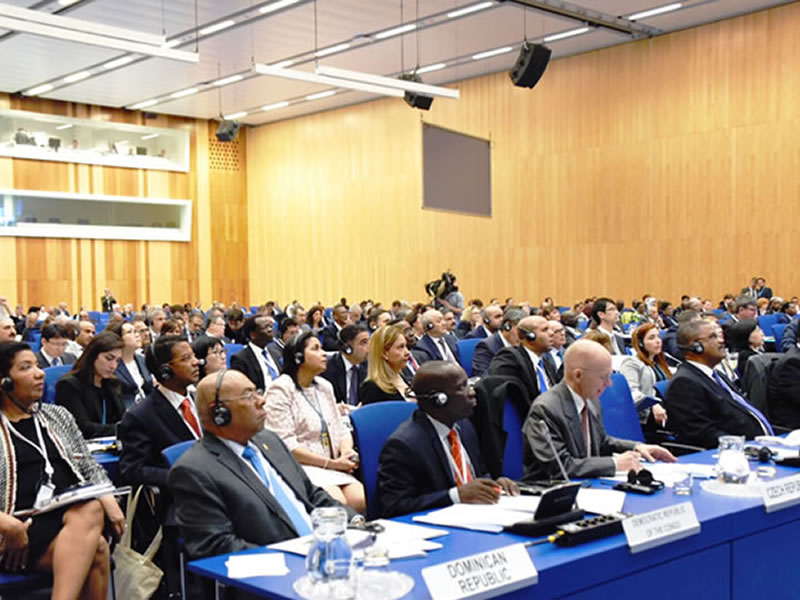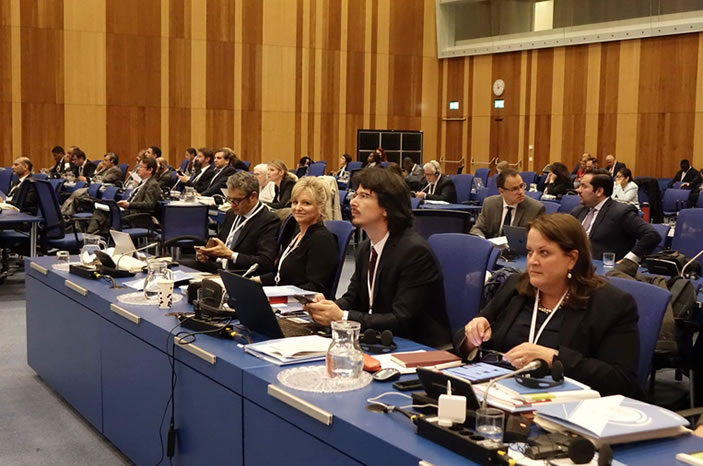Strengthening Judicial Integrity and Prevent Corruption in the Justice System

April 2018, UN Headquarters, Vienna, Austria
UNODC has consulted with approximately 4,000 judges from around the world and organized seven regional preparatory meetings over the last two years, to ascertain the successes and challenges faced by judges regarding judicial integrity, in line with article 11 of the United Nations Convention against Corruption. Ultimately, it is the recommendations expressed in these consultations that have provided UNODC with the basis for structuring the Global Judicial Integrity Network.


The launch event itself gave participants the chance to collaborate in person with other members of the judiciary, discuss key issues with Chief Justices from a variety of Member States, and provide recommendations on how members can work together to promote and strengthen judicial integrity through the Global Judicial Integrity Network.
During the launch, UNODC elaborated on the intended services and objectives of the Global Judicial Integrity Network, as well as took into consideration the findings of the participants. The final session of the event focused on the future activities of the Global Judicial Integrity Network.
Promotion of judicial impartiality and integrity are key objectives of the Global Judicial Integrity Network. The use of social media by judges poses challenges in meeting those objectives. While judges living in a modern world seek to conduct normal lives in a digital age, and try to balance their personal freedoms with their professional accountability, social media presents them with dangerous potential traps. Candid remarks on social media can indicate preferences and bias that undermine impartiality, and may even highlight potential conflicts that impact a judge’s integrity. As seen during the meeting of the Expert Group on Judicial Ethics Training Tools, judiciaries from around the world are looking for good practices and effective standards that can be implemented by their national judiciaries regarding the use of social media. During the panel, the participants discussed such recommendations based on collected best practices. They also heard first-hand about the positive aspects of social media, including its use for effective social outreach. Participation in such outreach activities is increasingly essential for the judiciary in building public support for their work.
Social media is a significant presence in the daily lives of people all over the world, including judges and judicial officials. This is especially true for younger judges, who have come of age in a digital world. Participation in various forms of new media forms by judges, however, gives rise to special ethical concerns and challenges. These include the propriety of content posted by judges, the unintended demonstration of bias or interest by a judge via his or her posts, and the unintended consequences arising from judicial interaction with third parties. The behaviour of judges on social media is visible to the public and therefore the activities of judges in their private life can harm the public trust in the judiciary as well as raise the question on impartiality and fairness of judge´s trails. On the flip side, social media can be an effective tool for outreach and public education. The use of social media may also challenge the public’s traditional perception of courts and judicial officers. At the end of the day, social media is also just a fact of modern life. A blanket instruction to judges to simply “stay off social media” is not a realistic directive in the current age.
The aim of panel Managing the Risks and Benefits of Use of Social Media by Judges was to identify and address some of the fundamental ethical implications for members of the judiciary of maintaining an on-line presence or using social networking, and to also provide practical recommendations and guidelines for judges on how to use social media ethically and responsibly. Contrary to some current guidance, we do not believe that an admonition to simply stay off of social media is realistic in today’s world. Limiting the use of social media by judges has been a recurring topic for discussion at the CEELI Institute, particularly within its Central and Eastern European Judicial Exchange Network, which is a platform for rising judges from the region, committed to addressing challenges related to strengthening the independence, integrity and accountability of the judiciary. The Network has identified examples and good practices that can be applicable beyond Central and Eastern Europe. These include the “Guidelines on Social Media Use for Judges”, developed by the Czech Union of Judges. These guidelines remain among the few existing formal recommendations for judges issued in any jurisdiction, to date.
The topic was presented by Network members who have significant expertise in this field. Included on this panel were Czech judge Ladislav Derka who is an author of the Czech guidelines on the use of social media by judges; Romanian judge Cristi Danilet who has significant experience with promoting and presenting his opinion on the judiciary and judicial issues via social media platforms, and who himself has thousands of followers on Facebook; and communication expert Ksenija Renko, JUPITER Strategic Consulting, from Croatia, who has recently cooperated on judicial communication strategy with Croatian Association of Croatian Judges and Ministry of Justice and has developed a series of recommendations for judges on how to behave on social media. Judge Barry Clarke, of the United Kingdom, who has spoken widely on this topic, also joined the panel. The outcome of the session is relevant to anyone responsible for setting guidelines for judicial conduct, including members of Judicial Councils, Court Presidents, officials from judicial associations, and any other members of the judiciary who need to set regulation on the behaviour of judges on social media. Those who are in the process of drafting or are thinking about drafting the Guidelines on Use of Social Media for Judges, Court spokespersons, or others responsible for public outreach and fostering better public understanding of the work of the courts.
The panellists pointed out that judges cannot completely stay disengaged from social media as it is a globally present part of life for a large number of the world’s population. Judges need to have an understanding of how social media influences public dialogue and communication in this day and age. The courts and national judiciaries should use this tool for outreach to the public, educating them and building trust in the judiciary. In this regard, the panellists encouraged the national judiciaries to elaborate judicial communication strategies, as well as guidelines on the use of social media. Guidelines on the use of social media are especially important for individual judges who have decided to be present on social media platforms. As there is no particular standard on these issues, judges often have to come up with their own individual solutions and approaches — which might lead them into situations involving conflicts of interests. Guidelines should set the limits on how to behave on social media in order to not undermine the integrity and independence of the judiciary. Guidelines should be developed based on good examples and best experiences that the judges have so far with the use of social media. It has been emphasized that all judges need to understand that although they might not be present on social media, their digital foot print might still be present in the virtual world and thus they need to take steps to secure their personal information in a way that will not have any influence on their independence and integrity. In this regard, effective judicial trainings should be provided on how to ensure the safe virtual environment for judges in order that they comply with judicial ethics.
Overall the judges agreed that global guidelines for judges on how to behave on social media are necessary. The CEELI Institute suggests creating a working group composed of judges, along with communication and legal experts, which will work on drafting “Guidelines on use of social media by judges”. The presenters and participants also agreed that judicial training on the security risks arising from their digital footprints has to be developed and introduced to judges globally. The judges should also be encouraged to educate their family members and friends about how their online activities can cause security risks for their relatives who are judges. The national judiciaries should be supported in the development and introduction of national communication strategies for the judiciaries. Social media is a useful tool to promote the judiciary and to exchange, effectively, information with the general public. Strategic approaches to this issue can help to improve public trust in the judiciary. Effective judicial training is essential to protect judges and to maintain compliance with ethical standards.
The judges discussed practical recommendations on how to behave on social media. Mrs. Ksenija Renko stressed that judges cannot stay away from the social media. It is the most effective way of communication because it provides real time news, increases public understanding and public trust and increases transparency and accountability. To use the media effectively, judges need to learn how to present their work in the media. Judges must carefully navigate their ethical concerns when communicating on social networks. That is not simple because the social media landscape is constantly shifting and there is often still no official guidance for judge’s communication on Social Media. Judges are forced to interpret rules on their own. To begin with, a judge must conduct all extrajudicial activities in a manner that does not interfere with applicable judicial codes of ethics. The fact that this kind of communication poses some risks does not mean that judges should stay away from social media. On the contrary, judges must maintain contact with the world in which they are asked to adjudicate. They must have an understanding of social circumstances, problems and dilemmas of people who appear before them. Social media is just one of the new communication tools and it is the behaviour and statements made by judges that can violate ethical duties – not the fact they are expressed on social media.
We live in a world where social media has become the main means of communication and it continues to develop rapidly. New possibilities for extended communication on the web and social media allow courts to communicate in completely new, creative and innovative ways and to ensure that courts are open, accessible and understandable to everyone. Social media actually offers a great opportunity for courts to meet the needs of their public and promote transparency for the purpose of supporting trust and confidence. Because of that, judges and courts should board that train. But they should also bear in mind that communication on social networks is neither simple nor harmless and that constant education of judges on a broad range of new media, on new communication principles, and about the technologies that make them possible is an imperative. Also, there should be clear rules that reflect common understanding of social media. These elements are of crucial importance for impartiality, integrity and transparency of judging in the 21st century.
The participants confirmed that judiciaries from around the world are looking for good practices and effective standards that can be implemented by their national judiciaries regarding the use of social media. Best practice guidelines will need to be developed which can suggest practices that will outline both the dangers and the value of social media usage. The CEELI Institute and the panel members and session participants are all among those willing to actively contribute to the creation of such a document. The participants recognized that the participation in social media platforms is an intrinsic part of modern life and that participation in such outreach activities is increasingly normal for judges. They also recognized that social media is an effective tool for the judiciary and individual judges to communicate with the public and to build public support and trust in their work.



